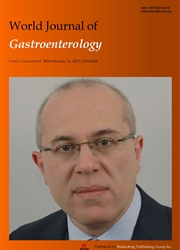

 中文摘要:
中文摘要:
AIM: To investigate the effects of daily telephonebased re-education(TRE) before taking medicine for the eradication of Helicobacter pylori(H. pylori) on the compliance and the eradication rate in a Chinese patient population.METHODS : Aprospective, physician-blind e d, randomized, controlled clinical study was conducted. The patients were randomly assigned to receive TRE every day before taking medicine(TRE group) or no TRE(control group). The patients in the TRE group received regular instructions before taking medicine for the eradication of H. pylori during the entire courseof treatment through telephone calls. The patients in the control group received detailed instructions at the time of seeing a doctor for the guidance. The primary outcome was the H. pylori eradication rate after treatment. The secondary outcomes included the clinical remissions after treatment, adverse events, compliance, and patients’ satisfaction.RESULTS: A total of 140 patients were randomized, 70 to the TRE group and 70 to the control group. As the primary outcome, the H. pylori eradication rates in the TRE and control groups were 62.7% and 71.2% in per protocol analysis(P = 0.230), and 52.9% and 52.9% in intention-to-treat analysis(P = 0.567), respectively. As the secondary outcomes, there were no significant differences in the patients’ satisfaction between the two groups(good, 79.7% vs 76.9%; fair, 13.6% vs 19.2%; poor, 6.7% vs 3.9%, for the TRE group and control group, respectively; P > 0.05 for all); the rates of adverse effects were 15.2% and 63.5% in the TRE and control groups, respectively(P < 0.001); the compliance rates in the TRE and control groups were 85.7% and 74.3%, respectively(P = 0.069).CONCLUSION: Daily TRE before taking medicine had no significant impact on the patients’ compliance, satisfaction, or H. pylori eradication, but reduced the rate of adverse events.
 英文摘要:
英文摘要:
AIM: To investigate the effects of daily telephonebased re-education(TRE) before taking medicine for the eradication of Helicobacter pylori(H. pylori) on the compliance and the eradication rate in a Chinese patient population.METHODS : Aprospective, physician-blind e d, randomized, controlled clinical study was conducted. The patients were randomly assigned to receive TRE every day before taking medicine(TRE group) or no TRE(control group). The patients in the TRE group received regular instructions before taking medicine for the eradication of H. pylori during the entire courseof treatment through telephone calls. The patients in the control group received detailed instructions at the time of seeing a doctor for the guidance. The primary outcome was the H. pylori eradication rate after treatment. The secondary outcomes included the clinical remissions after treatment, adverse events, compliance, and patients’ satisfaction.RESULTS: A total of 140 patients were randomized, 70 to the TRE group and 70 to the control group. As the primary outcome, the H. pylori eradication rates in the TRE and control groups were 62.7% and 71.2% in per protocol analysis(P = 0.230), and 52.9% and 52.9% in intention-to-treat analysis(P = 0.567), respectively. As the secondary outcomes, there were no significant differences in the patients’ satisfaction between the two groups(good, 79.7% vs 76.9%; fair, 13.6% vs 19.2%; poor, 6.7% vs 3.9%, for the TRE group and control group, respectively; P > 0.05 for all); the rates of adverse effects were 15.2% and 63.5% in the TRE and control groups, respectively(P < 0.001); the compliance rates in the TRE and control groups were 85.7% and 74.3%, respectively(P = 0.069).CONCLUSION: Daily TRE before taking medicine had no significant impact on the patients’ compliance, satisfaction, or H. pylori eradication, but reduced the rate of adverse events.
 同期刊论文项目
同期刊论文项目
 同项目期刊论文
同项目期刊论文
 Ef?cacy and safety of esomeprazole with ?upentixol/melitracen in treating gastroesophagea re?ux dise
Ef?cacy and safety of esomeprazole with ?upentixol/melitracen in treating gastroesophagea re?ux dise Polyethylene Glycol Electrolyte Lavage Solution versus Colonic Hydrotherapy for Bowel Preparation be
Polyethylene Glycol Electrolyte Lavage Solution versus Colonic Hydrotherapy for Bowel Preparation be Etomidate-Remifentanil ismore Suitable for Monitored Anesthesia Care during Gastroscop in Older Pati
Etomidate-Remifentanil ismore Suitable for Monitored Anesthesia Care during Gastroscop in Older Pati 期刊信息
期刊信息
